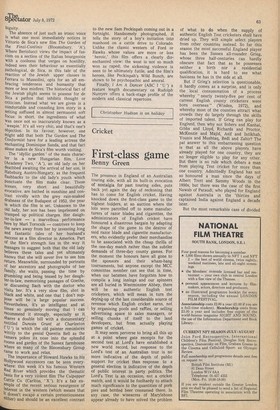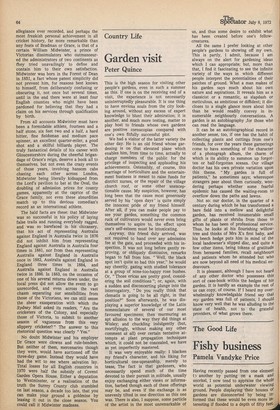Cricket
First-class game
Benny Green
The presence in England of an Australian touring side, with all its built-in evocation of nostalgia for past touring sides, puts back yet again the day of reckoning that has to come for English cricket. Having knocked down the first-class game to the highest bidders, at an auction where the lots were parcelled off to some manufacturers of razor blades and cigarettes, the administrators of English cricket have honoured a disastrous bargain by adapting the shape of the game to the desires • of said razor blade and cigarette manufacturers, who evidently prefer their merchandise to be associated with the cheap thrills of the one-day match rather than the subtler demands of three-day county games. For the moment the honours have all gone to the sponsors and their wham-bang tournaments, but anyone except the MCC committee member can see that in time, when our batsmen have forgotten how to compile a long innings and our spinners are all buried in Westminster Abbey, there will be no authentic English test cricketers, which will mean in turn the drying-up of the last considerable source of revenue which English cricket earns, not by organising pools and raffles, or selling advertising space to sales managers, or selling chunks of itself to the land developers, but from actually playing games of cricket.
It may seem perverse to bring all this up at a point where gate receipts for the second test at Lord's have established a new world record, but response to the Lord's test of an Australian tour is no more indicative of the depth of public support for cricket than response to a general election is indicative of the depth of public interest in party politics. The Lord's Test is an occasion, not a cricket match, and it would be foolhardy to attach much significance to the quantities of pork pies and bottled beer consumed there. In any case, the wiseacres of Marylebone appear already to have solved the problem of what to do when the supply of authentic English Test cricketers shall have dried up. They will simple select players from other countries instead. So far this season the most successful England player has been the Sussex all-rounder Grieg, whose three half-centuries can hardly obscure that fact that as he possesses neither a birth nor a residential qualification, it is hard to see what business he has in the side at all.
But if Grieg's selection is questionable, it hardly comes as a surprise, and is only the local consummation of a process whereby "nearly twenty-five per cent of current English county cricketers were born overseas" (Wisden, 1972), and whereby most of the counties attract what crowds they do largely through the skills of imported talent. If Grieg can play for England, then why not Sobers and Kanhai, Gibbs and Lloyd, Richards and Proctor, McKenzie and Majid, Asif and Intikhab, Younis and Mushtaq, Bedi and Zahir? The pat answer to this embarrassing question is that as all the above players have already played for one country, they are no longer eligible to play for any other. But there is no rule which debars a man from playing Test cricket for more than one country. Admittedly England has not so honoured a man since the days of Albert Trott and Sammy Woods in the 1890s, but there was the case of the first Nawab of Pataudi, who played for England against Australia in the 'thirties and captained India against England a decade later.
But the most remarkable case of divided allegiance ever recorded, and perhaps the most freakish personal achievement in all cricket history, far more remarkable than any feats of Bradman or Grace, is that of a certain William Midwinter, a prince of Victorian dissimulators who outmanoeured the administrators of two continents as they tried unavailingly to define and contain him to their own satisfaction. Midwinter was born in the Forest of Dean in 1851, a fact whose patent simplicity did not prevent him, for reasons best known to himself, from deliberately confusing or obscuring it, not once but several times, until in the end there were at least four English counties who might have been pardoned for believing that they had a claim on his services through qualification by birth.
From all accounts Midwinter must have been a formidable athlete, fourteen and a half stone, six feet two and a half, a hard hitter, fine fieldsman and medium pace spinner, an excellent quarter-miler, a good shot and a skilful billiards player. The truly fantastical details of his career with Gloucestershire during the cheerful brigandage of Grace's reign, deserve a book all to themselves, but not even the crazy events of those years, involving hansom cabs chasing each other across London, Midwinter being literally kidnapped from the Lord's pavilion to bat at the Oval, the doubling of admission prices for county games, apparently at the caprice of the Grace family, not even these absurdities match up to this devious comedian's record as an international athlete.
The bald facts are these: that Midwinter was so successful in his policy of laying false trails and running everybody ragged, and was so barefaced in his chicanery, that his act of representing Australia against England in Australia twice in 1876 did not inhibit him from representing England against Australia in Australia four times in 1881, nor from then representing Australia against England in Australia once in 1882, Australia against England in England three times in 1884, and Australia against England in Australia twice in 1886. In 1883, on the occasion of one of his several returns down under, the local press did not allow the event tb go unrecorded, and even across the vast chasm separating our sensibilities from those of the Victorians, we can still sense the sheer exasperation with which the Sydney Mail asked its readers, "Are the cricketers of the Colony, and especially those of Victoria, to submit to another season of vagueness from this very slippery cricketer?" The answer to this rhetorical question was clearly "Yes."
No doubt Midwinter and his employer Dr Grace were clowns and rule-benders. But neither of them, mercenaries though they were, would have auctioned off the three-day game. Instead they would have had the wit to see where salvation lay. Total losses for all English countries •in 1970 were half the subsidy of Covent Garden Opera House. Either a deputation to Westminster, or a realisation of the truth the Surrey County club stumbled on last season, a decade too late, that you can make your ground a goldmine by leasing it out in the close season. You could call it Midwinter madness.











































 Previous page
Previous page